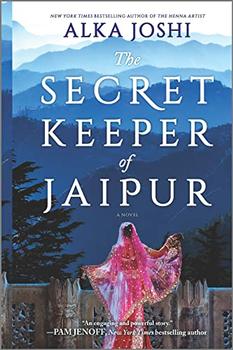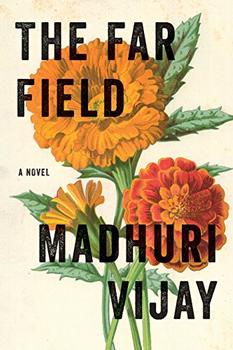Summary | Excerpt | Reading Guide | Reviews | Beyond the book | Read-Alikes | Genres & Themes | Author Bio

The Jaipur Trilogy #2
by Alka JoshiAlka Joshi's The Secret Keeper of Jaipur is the sequel to her 2020 bestseller The Henna Artist and the middle entry in the planned Jaipur Trilogy. The story opens in 1969, 12 years after the conclusion of the earlier work, and the three main characters (henna artist Lakshmi, her younger sister Radha and Lakshmi's ward Malik) have experienced great changes in their lives. Lakshmi is now married to Dr. Jay Kumar, a physician in remote Shimla (an Indian city in the foothills of the Himalayas). She works alongside him, balancing his formal medical skills with her knowledge of herbal remedies. Radha has become a perfumer living overseas with her French husband and their two daughters. And Malik has graduated from private school and returned to Jaipur (see Beyond the Book) at Lakshmi's insistence, apprenticing as an accountant at the Jaipur Royal Palace.
Most of the minor characters who played significant roles in The Henna Artist (the Singh family, Maharanis Indira and Latika, Manu and Kanta Agarwal) are represented in the sequel. While The Henna Artist is primarily relayed in the first person by Lakshmi, in this novel Joshi chooses to divide the narration between Lakshmi, Malik and a new character, Nimmi, a young widow from a Himalayan hill tribe whom Lakshmi invites to work at the Shimla clinic.
The bulk of the plot revolves around Malik and his new position in Jaipur. The Maharani Latika commissions the construction of a grand cinema, and he is present on opening night, granted the honor due to his apprenticeship with the palace architects. When the unthinkable happens and part of the structure collapses, blame lands where convenient, on those close to Malik. Sensing an injustice in progress, he seeks to uncover clues that point to those truly responsible. A secondary storyline concerns the relationships between the three main characters, as Malik and Nimmi fall in love and Lakshmi comes to realize that she must let the young man live his own life.
Joshi's writing shines as she describes the streets of Jaipur and the Himalayan countryside, as well as those who inhabit both environs. At one point Lakshmi thinks:
I'm looking out the window, enjoying the choreographed chaos of the city: a lipsticked hijra on her way to market, slim hips swaying; a wagon drawn by a bony laborer carrying old tractor tires; children flicking marbles on a dusty street corner…
Indian terms often appear without much context for readers who are unfamiliar with them, but a dictionary is included at the end of the book. The author also comments on cultural social norms in a way that feels natural.
Manu looked so lost; I wished that I had words to help him…He'd been raised to never question his superiors…For fifteen years, the royal family had employed him. He'd sooner cut his arm off than question their decisions or blame them for anything inappropriate.
Unfortunately, I didn't find Joshi's sophomore effort up to the standard set by the first book of the series. What made The Henna Artist so appealing was the strong, long-suffering Lakshmi, able to overcome all obstacles placed in her path with grace, fortitude and cleverness. That book was character-driven with very little action, yet its gossipy nature propelled the plot forward in a way that kept me rapt. I didn't like this version of Lakshmi as much — she's more reactionary and less self-reliant — and Nimmi often comes across as shrill and unnecessarily distrustful. Joshi has attempted to create a more plot-driven novel here, but there's no mystery, no tension; the outcome is a foregone conclusion that surprises no one. And finally, the sex scenes simply don't work; one in particular is completely gratuitous, being neither necessary nor a good fit for the rest of the story. The book is still certainly entertaining — it's just not at the level of The Henna Artist.
The author provides enough background information (including a helpful "who's who" at the front of the book) that for the most part the novel can be read as a stand-alone work. Indeed, there's some argument to be made that one might enjoy it more without the inevitable comparisons to the earlier book. Tackling the series in order, though, will allow readers to understand the characters and their motivations better, and for that reason I'd recommend the latter approach.
The Secret Keeper of Jaipur is a fast-moving, entertaining novel, and is recommended for most audiences looking for a light read. Readers who are interested in learning about Indian culture will find the author includes many interesting tidbits that will add to their knowledge. Those who enjoyed Joshi's earlier book will likely appreciate this new entry in the series.
![]() This review was originally published in The BookBrowse Review in September 2021, and has been updated for the
July 2022 edition.
Click here to go to this issue.
This review was originally published in The BookBrowse Review in September 2021, and has been updated for the
July 2022 edition.
Click here to go to this issue.

If you liked The Secret Keeper of Jaipur, try these:

by Madhuri Vijay
Published 2019
Gorgeously tactile and sweeping in historical and socio-political scope, Pushcart Prize-winner Madhuri Vijay's The Far Field follows a complicated flaneuse across the Indian subcontinent as she reckons with her past, her desires, and the tumultuous present.

by Neel Mukherjee
Published 2019
What happens when one attempts to exchange the life one is given for something better? Can we transform the possibilities we are born into?
Your guide toexceptional books
BookBrowse seeks out and recommends the best in contemporary fiction and nonfiction—books that not only engage and entertain but also deepen our understanding of ourselves and the world around us.